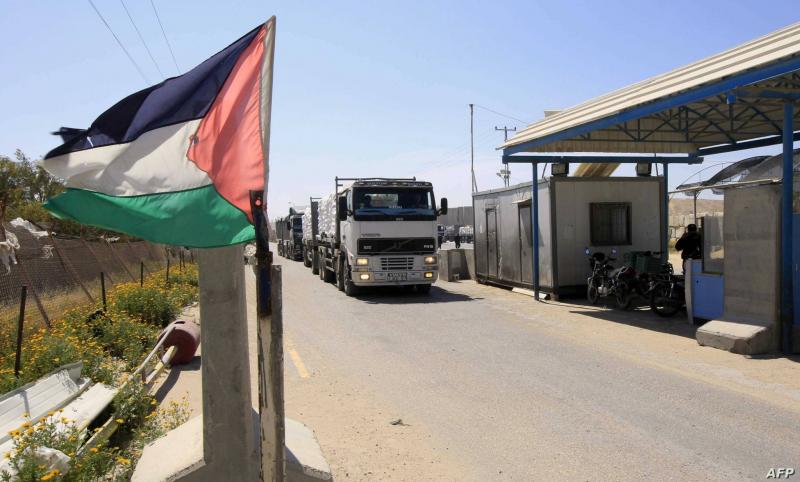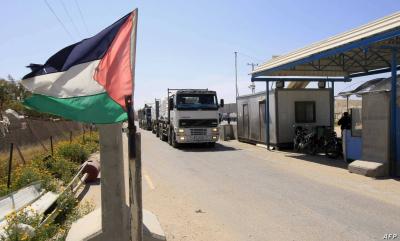The Kerem Shalom crossing has enabled the United States and Morocco to deliver aid trucks to Gaza in recent days, highlighting the importance of this crossing in alleviating the suffering of Palestinians trapped in the sector. U.S. State Department spokesperson Matthew Miller stated that about 250 aid trucks entered Gaza through the Rafah and Kerem Shalom border crossings. In December, Israel allowed aid trucks to cross into Gaza via Kerem Shalom for the first time since Hamas's attack on October 7 on adjacent areas. However, the rate of aid entry remains slow, with the UN Relief and Works Agency for Palestine Refugees in the Near East (UNRWA) reporting that Israeli protesters sometimes prevent trucks from entering through Kerem Shalom. Israeli activists claim that aid trucks go directly to Hamas, which is classified as a terrorist organization in the U.S. and some other countries, demanding that aid be halted until hostages held by Hamas since the October 7 attack are released.
Recently, Morocco announced the delivery of humanitarian aid to Gaza via the Kerem Shalom crossing. An unnamed source indicated that the trucks entered Gaza through this crossing to avoid complications that could arise from using the Rafah crossing with Egypt or air drops. The aid was flown to Israel before being loaded onto trucks operated by the Palestinian Red Crescent to ensure it reaches those in need in northern Gaza. According to CNN, angry Israeli citizens are working to disrupt food supplies headed to Gaza through Kerem Shalom, amid the leniency of Israeli border officers towards them.
On March 6, Miller stated that about 250 aid trucks had entered Gaza via the Rafah and Kerem Shalom crossings. He added that while aid distribution is showing some improvement, the amount entering Gaza is still insufficient, emphasizing the necessity for a substantial increase in aid.
Kerem Shalom is one of the main crossings for goods transportation between Israel and Gaza. According to the Israeli government’s website, the Kerem Shalom crossing is managed by the Israeli Defense Ministry's crossing authority, while the Palestinian side is run by private shipping companies responsible for transport, excluding fuel which is overseen by Palestinian Authority officials.
Located southeast of Gaza, the Kerem Shalom crossing is about 4 kilometers west of Rafah, at the intersection of the Gaza, Egypt, and Israel borders. Since the closure of the Karni crossing in 2011, Kerem Shalom has become the "lifeline" for Gaza's residents, handling over 60% of truck loads entering the sector and also facilitating the export of Palestinian products to the West Bank and abroad, according to the UN.
Colonel Moshe Tetro, director of the coordination and liaison office with Gaza, confirmed that the decision to allow humanitarian aid through the Kerem Shalom crossing was a commitment made in agreement with Washington. Israel began operating the Kerem Shalom crossing in 2005 to facilitate the entry of goods and humanitarian aid into Gaza, according to the Gisha organization, which focuses on protecting the freedom of movement for Palestinians, particularly in Gaza.
The crossing has undergone expansion and development since 2010, with a daily capacity of about 1,000 trucks, according to an Israeli center. The Israeli government frequently closes the crossing in response to rocket attacks from Gaza or when explosive materials are discovered, as announced by authorities, such as in September when it was closed after explosives were found hidden in a clothing truck.
Israel announced it would permit the first shipment of aid through the Kerem Shalom crossing into Gaza, a decision welcomed by the White House. Following the Hamas attack on October 7, the crossing was closed again, and aid was only delivered through the Rafah crossing with Egypt, until Israel allowed the first shipment through Kerem Shalom on December 15, a move praised by the White House.
At that time, the office of Israeli Prime Minister Benjamin Netanyahu stated that Israel had agreed to allow aid into Gaza through Kerem Shalom. The office indicated that this opening would help Israel meet its commitments to allow the entry of 200 aid trucks per day, as agreed in the only hostage deal implemented during a temporary ceasefire that lasted a week at the end of November.
Other crossings remain closed for now. The Gisha organization reports that Kerem Shalom has been the only commercial crossing with Israel since the closure of the Karni crossing and the Sofa crossing, which was used for building materials, in 2008, and the Nahal Oz crossing, which facilitated fuel and cooking gas transport in 2010. While Israel permits most goods to enter Gaza via Kerem Shalom, it restricts or prohibits the entry of items deemed "dual-use," which could be employed for military purposes, according to Gisha, highlighting that this list includes very essential items for industry, construction, and other civilian needs.
The last closure of the crossing occurred a month before the October 7 attack when Israeli authorities announced that they had suspended all exports of goods from Gaza to the West Bank and abroad after foiling an attempt to smuggle explosives from the sector. Following this decision, the Palestinian General Federation of Industries warned of "catastrophic" implications for the struggling Palestinian economy. Gaza Chamber of Commerce President Iyad Abu Ramadan raised concerns about the Israeli decision, labeling it "a new escalation of ongoing economic blockade policies on the Gaza Strip," warning of potential increases in unemployment and poverty.
Israeli goods enter Palestinian areas, with data from the Palestinian Central Bureau of Statistics indicating that over 85% of the total value of goods entering Gaza through Kerem Shalom are purchased from Israeli agents or companies. In August, around 5,176 trucks entered Gaza through this crossing, compared to 4,738 in July and 4,228 in June, according to human rights center data.
Israel reopened the Kerem Shalom commercial crossing to resume Palestinian exports from Gaza to the West Bank and Israel after a week of closure triggered by an attempt to smuggle explosives. Palestinian products, including flowers, clothing, vegetables, and various materials like scrap metal, have been exported through the crossing to the West Bank, Israel, and beyond.




